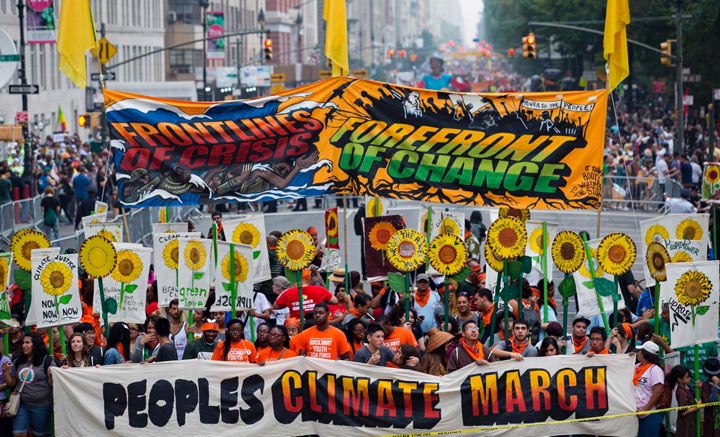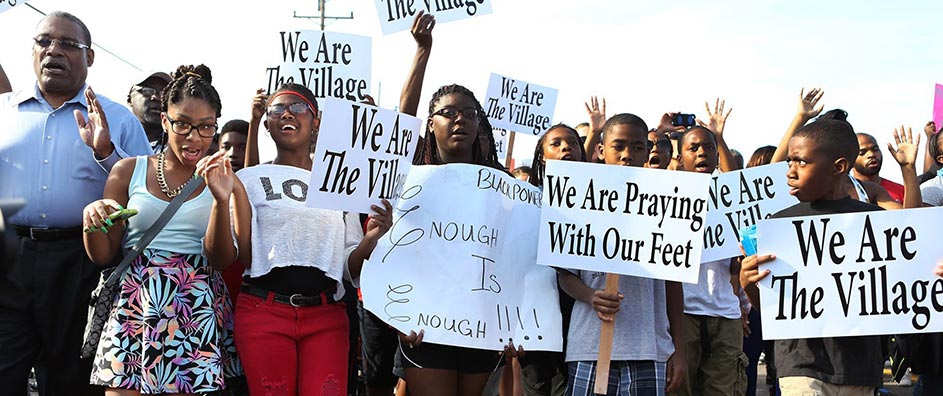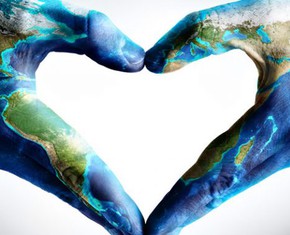The views expressed in our content reflect individual perspectives and do not represent the authoritative views of the Baha'i Faith.
We fumbled with colorful 16-foot banners, which moved like accordion folds as we dodged the few passing cars. We had assembled with marchers of every religious persuasion and age group. We had not practiced chants or ordered T-shirts. The only thing we wore in common were hospital masks passed around to help us breathe through the cloak of dark smoke inflicted by several nearby drought-related fires. With joy, we set out to march in solidarity with the Climate Change March in New York.
We represented a speck in the universe. People everywhere stepped out in groups to convey their convictions on September 21, 2014, because they cared about the effects of climate change. They wanted to seek swift action to reduce, amend, adapt to, divest from, or create social justice in response to the quickly mounting effects of reliance on fossil fuels.
Group action trended a few weeks earlier around another issue. Folks in small towns and urban centers across the US had galvanized around questions of bigotry, following racially-charged riots over a police shooting in Ferguson, Missouri. Many communities held deep discussions and public forums along with the demonstrations. Long-held tongues loosened. Tears re-emerged. Confessions surfaced. Demonstrations prevailed.
Remember what the world was like before 250,000 people followed Dr. Martin Luther King Jr. to march on Washington in 1963? While that struggle continues–and not just in Ferguson–the world has experienced many benefits from Dr. King’s march for the past fifty years. Those who have integrated their churches, living rooms, decision-making bodies and social circles have known the vibrancy that biodiversity brings, whether grafting two hybrid plants together to grow a red, seedless watermelon or by bringing multiple perspectives into a room and truly listening to the unique perspectives at play.
Both movements create an awareness that portends more hard work on the road ahead. Most of the lasting change generally occurs in the years after a march, through one teachable moment after another.

Hundreds of thousands of people turned out for the ’People’s Climate March’ in New York September, 2014
In September, as throngs marched to urge Wall Street stockbrokers and the UN’s Major Five to act courageously to uphold climate justice, some businesses did respond with divestments, encouraging those of us who marched down nearly vacant streets, ironically and iconically breathing in the smoke of wildfires now common in the face of a 500-year drought. Yet this small step must lead somewhere.
For each crisis the world faces, institutions must employ new sensibilities, innovations, engineering concepts, policies, and adaptations made over the next half-century or so. As we have seen, technological and intellectual progress alone will not create reforms. The most diligent doers will not just flood Wall Street but will trickle into homes and classrooms and board rooms where parents, educators and community leaders see real change for what it is–an organic process with initiative, hard work, and selfless motivation as its stimuli. In other words, spiritual maturity and social action go hand in hand with knowledge to create real change.
On September 21, 650,000 (more than twice the number who marched on Washington in 1963) again marched in New York–and across the world. Will this march swing the pendulum toward compassion for all those affected by the next 50 years of climate change? The Baha’i writings have an answer:
Every age hath its own problem, and every soul its particular aspiration. The remedy the world needeth in its present-day afflictions can never be the same as that which a subsequent age may require. Be anxiously concerned with the needs of the age ye live in, and center your deliberations on its exigencies and requirements. – Baha’u’llah, Gleanings from the Writings of Baha’u’llah, p. 213.
Baha’is see the value of educating the next generation to correct the pressing social, racial and environmental issues of the age–not only by acquiring skills in the sciences and arts but also by teaching the relationship between spiritual and social responsibility. Educating the young to recognize “the exigencies of the age” and apply their critical thinking skills and spiritual energies to that end may offer our best hope for long-term change:
Again, is there any deed in the world that would be nobler than service to the common good? Is there any greater blessing conceivable for a man, than that he should become the cause of the education, the development, the prosperity and honor of his fellow-creatures? – Abdu’l-Baha, The Secret of Divine Civilization, p. 103.
I shiver to think of the potential of the September march if each of the 650,000 marchers commits not just to a march but to a path. In this way, the gains of one long day may last for many long generations.
















Comments
Sign in or create an account
Continue with Googleor